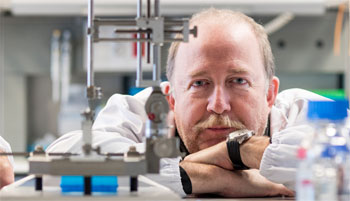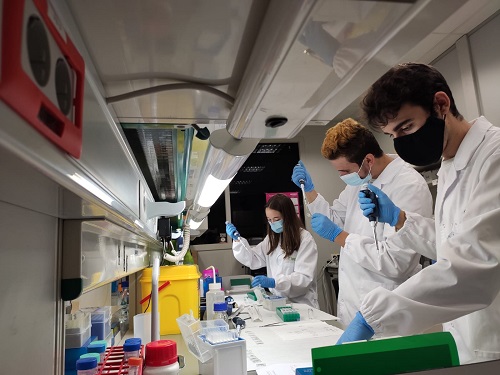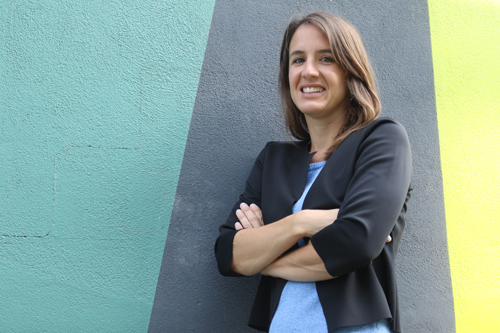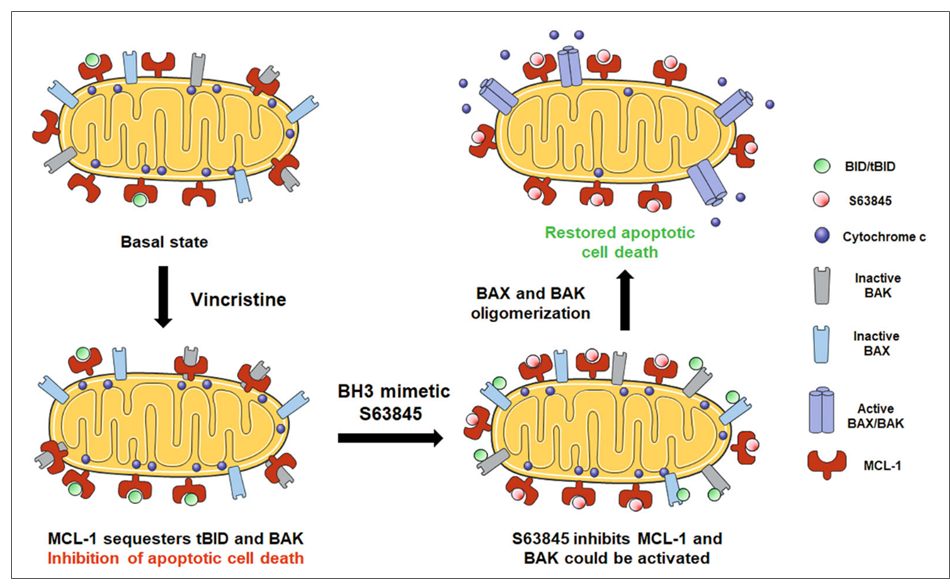 Àngels López
Àngels López
Bioengineering against cancer
Xavier Trepat and Pere Roca-Cusachs, group leaders at IBEC, appear on the journal “ABC” explaining their research project that they will carry out thanks to funding from “la Caixa” as part of the «Health Research Call ».
Postdoc position in NeuroRobotics at the SPECS-lab Research Group

Application Deadline: 30/11/2020
Ref: PD-PV
The Synthetic, Perceptive, Emotive and Cognitive Systems (SPECS) group at the Institute for Bioengineering of Catalonia (IBEC) is offering a Postdoctoral position in NeuroRobotics. The successful candidate will lead SPECS’ NeuroRobotics lab and drive the research on Cognitive Architectures in the context of the Distributed Adaptive Control theory of mind and brain that SPECS-lab has been elaborating over many years [1, 2, 3, 4].
We are seeking a candidate to advance the DAC Architecture towards a whole brain implementation, which maps this cognitive architecture to the main structures of the mammalian brain. We will test these models on robots both targeting rodents level tasks such as foraging and navigation but also, we want to look at human level tasks such as social interaction and motor rehabilitation. The candidate will work directly with the director of SPECS-lab, ICREA Professor Dr. Paul Verschure.
1. Verschure, Paul FMJ. “Synthetic consciousness: the distributed adaptive control perspective.” Philosophical Transactions of the Royal Society B: Biological Sciences 371, no. 1701 (2016): 20150448.
2. Verschure, PFMJ, Pennartz, CM, & Pezzulo, G. (2014). The why, what, where, when and how of goal-directed choice: neuronal and computational principles. Phil. Trans. R. Soc. B, 369(1655), 20130483.
3. Verschure, P. F. (2012). Distributed adaptive control: a theory of the mind, brain, body nexus. Biologically Inspired Cognitive Architectures, 1, 55-72.
4. Verschure, PFMJ T Voegtlin T, RJ Douglas (2003) – Environmentally mediated synergy between perception and behaviour in mobile robots Nature – pdfs.semanticscholar.org
Laboratory Technician at the Research Group Biosensors for Bioengineering

Application Deadline: 15/10/2020
Ref: LTII-IM
The The Biosensors for Bioengineering Group group at the Institute for Bioengineering of Catalonia (IBEC) is looking for a laboratory technician to work on the development of radiofrequency coils for magnetic resonance to study metabolism on tissue engineered organ-on-a-chip systems.
The contract will be within the framework of the EU FET Open project “Benchtop NMR spectrometer for lab-on-a-chip” (https://blocproject.eu), whose objective is the development of non-invasive assays based on hyperpolarized magnetic resonance (MR) to study real-time metabolism on tissue engineered organ-on-a-chip systems.
Laboratory Technician at the Research Group Biosensors for Bioengineering

Application Deadline: 30/09/2020
Ref: LT-IM
The The Biosensors for Bioengineering Group group at the Institute for Bioengineering of Catalonia (IBEC) is looking for a laboratory technician to work on the development of magnetic resonance tools to study metabolism on cell cultures and tissue engineered organ-on-a-chip systems. As part of our efforts to create a platform for tailored drug testing, the successful candidate will be involved in the technical development of Carbon-13 hyperpolarization methods, as well as carrying out work on the cell culture and tissue engineering side of the project.
This multidisciplinary project is at the interface between physics, chemistry, biochemistry and tissue engineering.
The contract will be within the framework of the EU FET Open project “Benchtop NMR spectrometer for lab-on-a-chip” (https://blocproject.eu), whose objective is the development of non-invasive assays based on hyperpolarized magnetic resonance (MR) to study real-time metabolism on tissue engineered organ-on-a-chip systems.
Back to school, back to the lab!
 The holidays are over and it’s time to go back to work, also for our youngest and curious minds of the students that visit us every year. Despite the situation we are experiencing due to the coronavirus outbreak, at the Institute for Bioengineering of Catalonia (IBEC) we are making an effort to resume some of our outreach activities in person.
The holidays are over and it’s time to go back to work, also for our youngest and curious minds of the students that visit us every year. Despite the situation we are experiencing due to the coronavirus outbreak, at the Institute for Bioengineering of Catalonia (IBEC) we are making an effort to resume some of our outreach activities in person.
In this sense, the IBEC laboratories have reopened the doors for the students participating in the “Bojos per la Bioenginyeria” and the “Batx2Lab” programs, adapting to this “new normality”.
Benedetta Bolognesi featured at “Maldita Ciencia” talking about coronavirus
 Benedetta Bolognesi, group leader at IBEC has been collaborating with “Maldita Ciencia” to clarify doubts and rumours about Covid-19″.
Benedetta Bolognesi, group leader at IBEC has been collaborating with “Maldita Ciencia” to clarify doubts and rumours about Covid-19″.
A new method to find the best treatment for pediatric cancer
A study led by researchers from the Nanobioengineering Group at IBEC, in collaboration with other research centers and hospitals in Barcelona, uses a predictive biomarker to anticipate the success of drugs against rhabdomyosarcoma, which represents around 5 percent of childhood tumors . This advance can help in predicting treatment efficiency thus, avoiding tumor resistance and decreasing undesired secondary effects.
New method could help to find the best treatment for a pediatric cancer
A study led by IBEC researchers from the Nanobioengineering group, uses a functional predictive biomarker to anticipate the effect of treatments against rhabdomyosarcoma, the most common soft-tissue cancer affecting childhood and adolescence.
This advance can help in predicting treatment efficiency thus, avoiding tumor resistance and decreasing undesired secondary effects.
Assistent de laboratori per al grup Cellular and molecular mechanobiology

Application Deadline: 14/09/2020
Ref: LA-PR
El grup de Mecanobiologia cel·lular de L’ Institute for Bioengineering of Catalonia (IBEC) requereix incorporar un/a Assistant de Laboratori en l’enotrn interdisciplinary del grup que combina biologia cel·lular amb tècniques de biofísica I de microscopia avançada.


 José Antonio del Río, group leader at IBEC, has received funding from the “CaixaHealath” call from “la Caixa” to continue advancing in the fight against Alzheimer’s.
José Antonio del Río, group leader at IBEC, has received funding from the “CaixaHealath” call from “la Caixa” to continue advancing in the fight against Alzheimer’s.



 The holidays are over and it’s time to go back to work, also for our youngest and curious minds of the students that visit us every year. Despite the situation we are experiencing due to the coronavirus outbreak, at the Institute for Bioengineering of Catalonia (IBEC) we are making an effort to resume some of our outreach activities in person.
The holidays are over and it’s time to go back to work, also for our youngest and curious minds of the students that visit us every year. Despite the situation we are experiencing due to the coronavirus outbreak, at the Institute for Bioengineering of Catalonia (IBEC) we are making an effort to resume some of our outreach activities in person. 
 Benedetta Bolognesi, group leader at IBEC has been collaborating with “Maldita Ciencia” to clarify doubts and rumours about Covid-19″.
Benedetta Bolognesi, group leader at IBEC has been collaborating with “Maldita Ciencia” to clarify doubts and rumours about Covid-19″.
